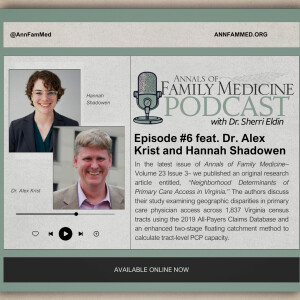
Wednesday May 28, 2025
Ep. 6: Neighborhood Determinants of Primary Care Access in Virginia, feat. Hannah Shadowen, PhD, and Dr. Alexander Krist(Vol. 23 Iss. 3)
Primary care improves the health of communities and decreases health inequities, yet workforce shortages have worsened in the United States. This study, titled "Neighborhood Determinants of Primary Care Access in Virginia," aimed to identify geographic disparities of the primary care workforce in Virginia and identify factors associated with primary care physician (PCP) access. In this episode, authors Hannah Shadowen, third-year medical student, and Alexander Krist, MD, MPH discuss the study in detail.
Researchers used the 2019 Virginia All-Payers Claims Database to identify PCPs and the number of patients seen by each physician. They then measured how many PCPs each census tract could reach within a 30‑minute drive, flagging tracts with too few as having poor access. Associations between PCP access and predisposing (age, race), enabling (income, insurance), need and structural (rurality, segregation) factors were assessed.
Main Results:
- Nearly half (44%) of Virginia’s census tracts lacked adequate PCP access.
- Racial segregation and rurality had the greatest associations with PCP access: tracts with higher proportions of Black residents had significantly greater PCP access than those with higher proportions of White residents, while rural tracts had significantly less access.
No comments yet. Be the first to say something!